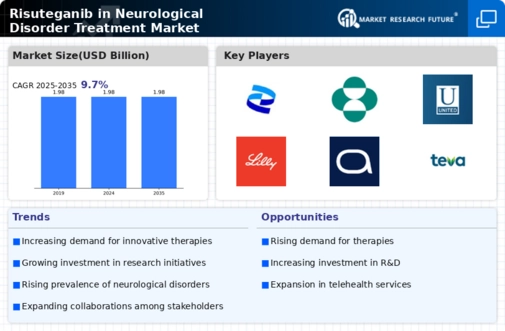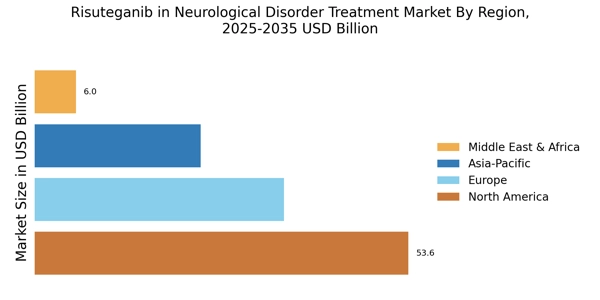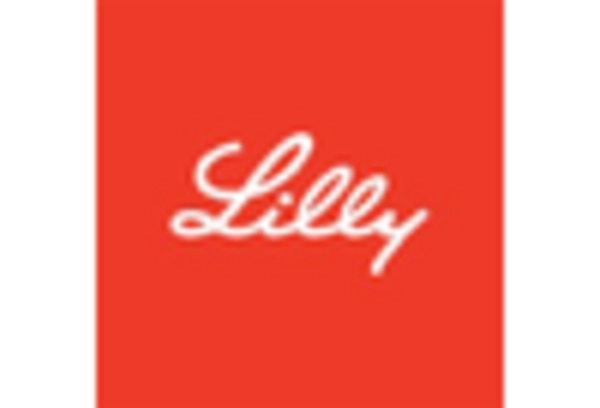Growing Investment in Neurological Research
The surge in investment directed towards neurological research is a pivotal driver for the Risuteganib in Neurological Disorder Treatment Market Industry. Governments and private entities are increasingly recognizing the need to allocate resources to combat the rising prevalence of neurological disorders. In recent years, funding for research initiatives has seen a marked increase, with billions of dollars being invested annually to explore new treatment modalities. This influx of capital not only supports the development of Risuteganib but also encourages collaboration among academic institutions, pharmaceutical companies, and research organizations. Such partnerships are essential for advancing the understanding of complex neurological conditions and accelerating the translation of research findings into clinical applications. The commitment to enhancing neurological research is likely to yield significant dividends in the form of innovative therapies, including Risuteganib.
Regulatory Support for Innovative Therapies
Regulatory bodies are increasingly providing support for the development of innovative therapies, which serves as a crucial driver for the Risuteganib in Neurological Disorder Treatment Market Industry. Initiatives aimed at expediting the approval process for breakthrough therapies are becoming more common, allowing for faster access to potentially life-changing treatments. For instance, programs such as the FDA's Breakthrough Therapy Designation facilitate the development and review of drugs that demonstrate substantial improvement over existing therapies. This regulatory environment encourages pharmaceutical companies to invest in the development of novel treatments like Risuteganib, as the pathway to market becomes more streamlined. As regulatory frameworks continue to evolve in favor of innovation, the market for Risuteganib is likely to expand, providing patients with timely access to new therapeutic options.
Advancements in Drug Development Technologies
Technological advancements in drug development are transforming the landscape of the Risuteganib in Neurological Disorder Treatment Market Industry. Innovations such as high-throughput screening, artificial intelligence, and biomarker identification are streamlining the drug discovery process, enabling faster and more efficient development of new therapies. These technologies facilitate the identification of potential candidates like Risuteganib, which may offer novel mechanisms of action for treating neurological disorders. Furthermore, the integration of data analytics in clinical trials enhances the ability to assess efficacy and safety, potentially reducing the time to market for new treatments. As these advancements continue to evolve, they are likely to attract significant investment, thereby fostering a more dynamic and competitive market environment for Risuteganib and similar therapies.
Increasing Prevalence of Neurological Disorders
The rising incidence of neurological disorders such as Alzheimer's disease, Parkinson's disease, and multiple sclerosis is a primary driver for the Risuteganib in Neurological Disorder Treatment Market Industry. According to recent estimates, the number of individuals affected by these conditions is projected to increase significantly in the coming years, potentially reaching over 100 million cases worldwide by 2030. This growing patient population necessitates the development of effective treatment options, thereby creating a robust demand for innovative therapies like Risuteganib. As healthcare systems strive to address this escalating burden, investments in research and development are likely to intensify, further propelling the market forward. The urgency to find effective solutions for these debilitating conditions underscores the critical role of Risuteganib in the evolving landscape of neurological disorder treatments.
Rising Awareness and Education on Neurological Disorders
The increasing awareness and education surrounding neurological disorders are driving demand within the Risuteganib in Neurological Disorder Treatment Market Industry. As public understanding of these conditions grows, so does the urgency for effective treatment options. Campaigns aimed at educating both healthcare professionals and the general public about the symptoms and impacts of neurological disorders are gaining traction. This heightened awareness is likely to lead to earlier diagnosis and treatment, thereby increasing the patient population seeking therapies like Risuteganib. Additionally, as patients become more informed about their treatment options, they may advocate for access to innovative therapies, further propelling market growth. The interplay between awareness and treatment-seeking behavior is expected to play a significant role in shaping the future landscape of the neurological disorder treatment market.

















